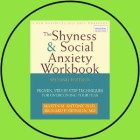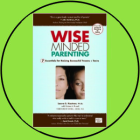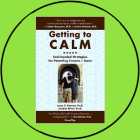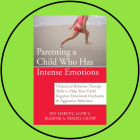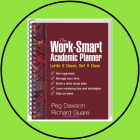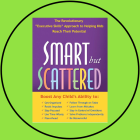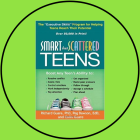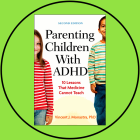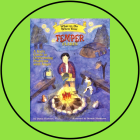Tag Archives:book
Shyness and Social Anxiety Workbook: Proven, Step-by-Step Techniques for Overcoming your Fear by Martin M. Antony PhD and Richard Swinson MD FRCPC FRCP share
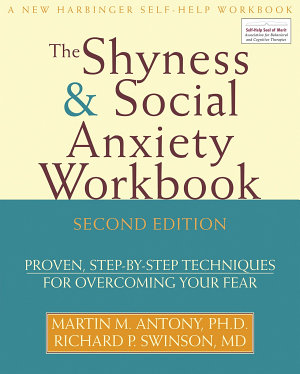 I recommend using this book when working with adults and some teens who have high levels of shyness and social anxiety. In a clear, and easy to read fashion, this book takes you step-by-step through the process of learning about how cognitive behavioral therapy (CBT) views shyness and social anxiety and is a powerful tool in overcoming how these thoughts and feelings can hold you back from living your life in a way that you are comfortable and happy with. CBT is a therapeutic philosophy and a large body of scientific research strongly supports CBT as the foremost treatment of social anxiety.
I recommend using this book when working with adults and some teens who have high levels of shyness and social anxiety. In a clear, and easy to read fashion, this book takes you step-by-step through the process of learning about how cognitive behavioral therapy (CBT) views shyness and social anxiety and is a powerful tool in overcoming how these thoughts and feelings can hold you back from living your life in a way that you are comfortable and happy with. CBT is a therapeutic philosophy and a large body of scientific research strongly supports CBT as the foremost treatment of social anxiety.
I do think that most people would still need a therapist to be guiding them through the process because for the individual working to learn these skills and challenging themselves to try new things, it can take a lot of energy. When a therapist is coaching you in the sidelines (and celebrating your successes with you), it frees you up to devote all of your energy towards growing. However, over time, these are skills that you will learn and can take with you forever. Once you understand how it works and how powerful it is, you will be able to use this approach to tackle any similar issues that should come up for you in the future.
As a therapist, I don’t use this book alone. I supplement it with concrete, scientifically grounded information about relaxation breathing, Growth Mindset as well as other customized handouts and tally sheets for homework.
Wise Minded Parenting: 7 Essentials for Raising Successful Tweens + Teens by Laura Kastner, PhD share
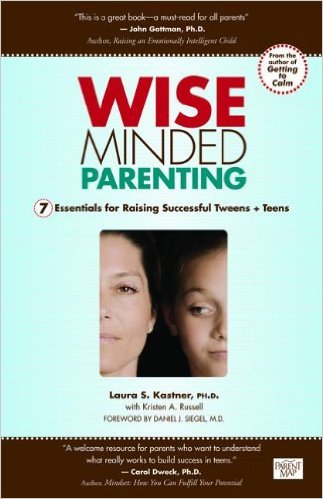 Dr. Kastner is a developmental psychologist, which means that she is very well acquainted with what research tells us about how the brain grows and learns across the lifespan. She is a colleague of Dr. Marsha Linehan (the founder of Dialectical Behavioral Therapy) and combines the powerful, research validated work of Dr. Linehan with her own vast knowledge of children. This book is the result. It is one that I haven’t read yet but it’s joining my “to read” pile. I decided to put it up on the site now, before having read it personally, because I have recently seen a video of Dr. Kastner speaking publicly and I think she has a wonderful, informed approach AND communicated these thoughts in an understandable manner. Not only do I suspect that this will be a very helpful resource for any parent, my hope is that this book will particularly make a great companion to Parenting a Child Who Has Intense Emotions: Dialectical Behavior Therapy Skills to Help Your Child Regulate Emotional Outbursts and Aggressive Behaviors by Pat Harvey, ACSW, LCSW-C. Reviews indicate that Dr.Kastner gives lots of concrete examples of things to say and do when intervening with your child. If you want to hear more from Dr. Kastner, jump on over to Teen Extremes: Regulating Moods in the Age of Anxiety with Dr. Marsha Linehan & Dr. Laura Kastner. Her talk starts around the 40 minute mark.
Dr. Kastner is a developmental psychologist, which means that she is very well acquainted with what research tells us about how the brain grows and learns across the lifespan. She is a colleague of Dr. Marsha Linehan (the founder of Dialectical Behavioral Therapy) and combines the powerful, research validated work of Dr. Linehan with her own vast knowledge of children. This book is the result. It is one that I haven’t read yet but it’s joining my “to read” pile. I decided to put it up on the site now, before having read it personally, because I have recently seen a video of Dr. Kastner speaking publicly and I think she has a wonderful, informed approach AND communicated these thoughts in an understandable manner. Not only do I suspect that this will be a very helpful resource for any parent, my hope is that this book will particularly make a great companion to Parenting a Child Who Has Intense Emotions: Dialectical Behavior Therapy Skills to Help Your Child Regulate Emotional Outbursts and Aggressive Behaviors by Pat Harvey, ACSW, LCSW-C. Reviews indicate that Dr.Kastner gives lots of concrete examples of things to say and do when intervening with your child. If you want to hear more from Dr. Kastner, jump on over to Teen Extremes: Regulating Moods in the Age of Anxiety with Dr. Marsha Linehan & Dr. Laura Kastner. Her talk starts around the 40 minute mark.
Getting to Calm: Cool-Headed Strategies for Parenting Tweens + Teens by Laura S. Kastner PhD & Jennifer Wyatt, PhD share
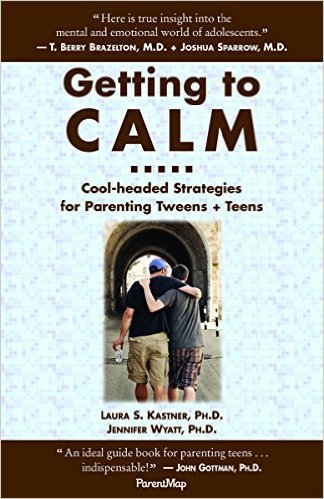 I intend to get around to reading this myself. My “to read” book pile is quite high at the moment. So many wonderful ideas, so little time! However, on surface glance, it appears that it would be a quality resource to recommend to parents who are in the throws of struggling with their excessively moody teen.
I intend to get around to reading this myself. My “to read” book pile is quite high at the moment. So many wonderful ideas, so little time! However, on surface glance, it appears that it would be a quality resource to recommend to parents who are in the throws of struggling with their excessively moody teen.
I am a fan of Dr. Kasner’s, after seeing her speak in a YouTube video, that I highly recommend. She does a wonderful job of weaving what science now tells us about the teen brain into a cohesive approach to parenting teens.
Parenting a Child Who Has Intense Emotions: Dialectical Behavior Therapy Skills to Help Your Child Regulate Emotional Outbursts and Aggressive Behaviors by Pat Harvey, ACSW, LCSW-C share
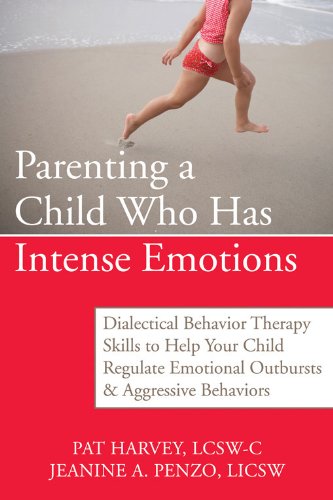 A truly insightful book that helps parents to step out of the power struggles that we adults can so easily find ourselves in with children and teens who experience emotions in a big way. Kids who seem to blow-up over nothing, struggle with transitions, seem to be constantly challenging adult authority, or be intent on badgering you into submission for whatever they want are actually really struggling. They don’t like feeling out of control like this but don’t yet have the skills they need to calm themselves down, to soothe themselves, and to handle things in a calmer manner.
A truly insightful book that helps parents to step out of the power struggles that we adults can so easily find ourselves in with children and teens who experience emotions in a big way. Kids who seem to blow-up over nothing, struggle with transitions, seem to be constantly challenging adult authority, or be intent on badgering you into submission for whatever they want are actually really struggling. They don’t like feeling out of control like this but don’t yet have the skills they need to calm themselves down, to soothe themselves, and to handle things in a calmer manner.
Often our first impulse as parent is to come down harder on these kids, grappling with the feeling that we have lost control of a situation that we “should” be in control of and trying to re-establish a sense authority. We put a great deal of pressure on ourselves to fix the problem and this stress makes us even more likely to lose our temper. We find ourselves reacting in ways that we never would have imagined back in the days when having a child was a dream and not yet reality. We wonder, “How have I come to be a person who yells, physically intimidates, or even possibly gets into physical altercations with my kid?” We think, “I have punished them with every consequence I can think of and nothing works!” We worry, “How is all of this conflict affecting our other children?” and “What will become of my child if we don’t get this turned around?”
The reality is that these kids respond VERY poorly to attempts to dominate them and punish them into compliance and it only serves to escalate the arguments and tension in the household while, at the same time, make them feel worse about themselves. Secondary problems can crop up like depression and suicidal thoughts.
What else is there to do? Based firmly in scientific research, this book helps parents understand the emotional struggles that kids like this are grappling with and how miserable they really feel when their emotions are out of control. It helps you find ways to show your child or teen that you love them, understand that they are struggling, and gradually teach them coping strategies that can help them to regulate their emotions. Additionally, it helps parents to set limits and expectations that are realistic and even therapeutic. If you have been reading this review and have been brought to tears by how much this describes your life with your child, I truly can’t recommend this book enough.
I would also like to add a message of hope. Kids and adults who tend to experience their emotions very intensely also have many strengths and can “use their powers for good.” These are folks who are passionate and tenacious. They are artistic. They feel the pain of other’s deeply and care about making positive changes in the world. When they learn to harness their feelings constructively and focus their energies on projects that interest them, the things that they are capable of is incredible! Looking through the “lens” of the medical model, labels/diagnoses that are often connected to these types of kids are: ADHD, ODD, Asperger’s, Bi-Polar Disorder, and Borderline Personality Disorder. I caution you to only lean on labels like this for what they can do for you. Often labels like this cause harm because some people take it to mean that something is “wrong” with them; that they are “broken.” I don’t think this is a helpful or healthy perspective. You can read more of my thoughts on this here.
So, if you are struggling with a child who has intense emotions, get this book. Also, I urge you to strongly consider finding a therapist (or two) who has experience working with children/teens AND who has experience using the theoretical framework this book is based on, DBT (Dialectical Behavior Therapy). This is a tough road to go alone for both the child and the parent. If you are at your wit’s end, it can also help a great deal for you (together with other parental figures in the home) to have your own therapist to guide you though the process, helping to shift your approach with your child to one that teaches emotion regulation instead of constantly doing battle with them. Ideally, signing release forms so the two therapists can coordinate the work they do with your family will help the process to be as effective and efficient as possible.
PS – You may also want to check out this video, Teen extremes: Regulating Moods in the Age of Anxiety, as it based on the DBT concepts described in the book and presented by Dr. Marsha Linehan, the actual psychologist who developed DBT.
* I don’t make any money from the books that I recommend. My reviews are solely based on wanting to let people know what’s out there and could be helpful to them.
The Work-Smart Academic Planner: Write It Down, Get It Done by Peg Dawson EdD & Richard Guare PhD share
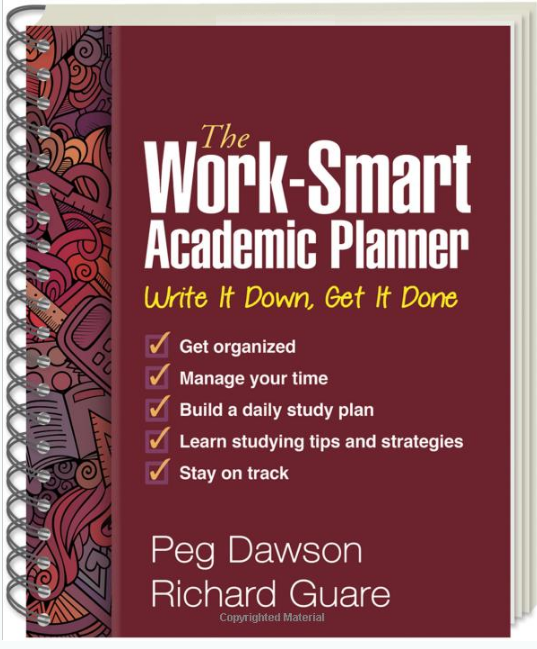 A review of this is yet to come. I have ordered my copy… just learned that this planner exists! Amazon reports that it’s geared to kids in 6-12th grades. These authors have two other books that I recommend, Smart but Scattered & Smart But Scattered Teens. The authors’ do a great job of making things understandable in a way that doesn’t leave the reader feeling stupid. When you struggle with these skills, it can be easy to get down on yourself. These authors can do a great job of pulling you back up to feeling like you are smart and capable. So, this letter might be worth having.
A review of this is yet to come. I have ordered my copy… just learned that this planner exists! Amazon reports that it’s geared to kids in 6-12th grades. These authors have two other books that I recommend, Smart but Scattered & Smart But Scattered Teens. The authors’ do a great job of making things understandable in a way that doesn’t leave the reader feeling stupid. When you struggle with these skills, it can be easy to get down on yourself. These authors can do a great job of pulling you back up to feeling like you are smart and capable. So, this letter might be worth having.
* I don’t make any money from the books that I recommend. My reviews are solely based on wanting to let people know what’s out there and could be helpful to them.
Smart But Scattered by Peg Dawson, EdD & Richard Guare, PhD share
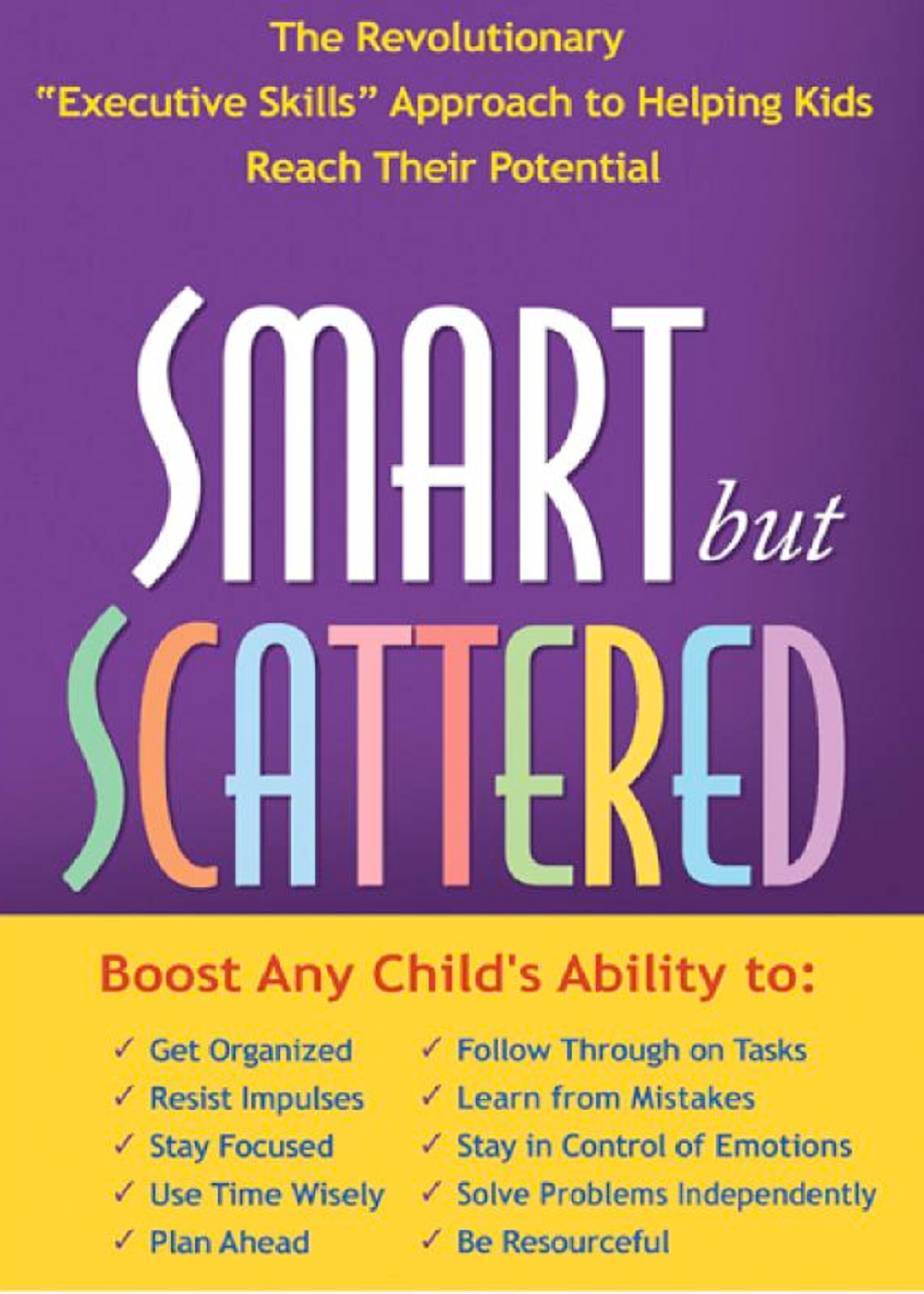 While I own this book, I have not had a chance to give it a read. It is geared towards parents of 4-13 year-old kids. You can check out my review of their companion book, Smart but Scattered Teens, which I suspect is pretty similar to this one. Additionally, in creating this review, I was excited to learn that they now have a Work-Smart Academic Planner that I will be reviewing as soon as I get my hands on a copy!
While I own this book, I have not had a chance to give it a read. It is geared towards parents of 4-13 year-old kids. You can check out my review of their companion book, Smart but Scattered Teens, which I suspect is pretty similar to this one. Additionally, in creating this review, I was excited to learn that they now have a Work-Smart Academic Planner that I will be reviewing as soon as I get my hands on a copy!
* I don’t make any money from the books that I recommend. My reviews are solely based on wanting to let people know what’s out there and could be helpful to them.
Smart But Scattered Teens by Richard Guare, PhD, Peg Dawson, EdD, and Colin Guare share
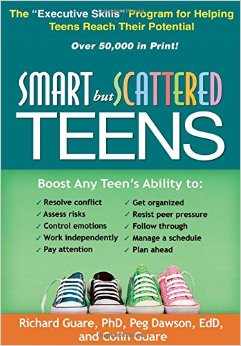 With a sense of humor and practicality, the authors of this book provide concrete, step-by-step ways to take a look at your teen’s (and yours!) strengths and weaknesses in terms of organization and planning. They then provide information about how people’s brains work and how having “executive functioning” challenges effects people’s day-to-day lives. They guide you through ways to improve these types skills with respect and compassion. The thing I like most about this book is that they emphasize that people with very smart brains can struggle with these skills. Geared to the 13 and up crowd, they also have companion books for younger kids (Smart but Scattered) as well as a new, Work-Smart Academic Planner that I’m excited to be checking out!
With a sense of humor and practicality, the authors of this book provide concrete, step-by-step ways to take a look at your teen’s (and yours!) strengths and weaknesses in terms of organization and planning. They then provide information about how people’s brains work and how having “executive functioning” challenges effects people’s day-to-day lives. They guide you through ways to improve these types skills with respect and compassion. The thing I like most about this book is that they emphasize that people with very smart brains can struggle with these skills. Geared to the 13 and up crowd, they also have companion books for younger kids (Smart but Scattered) as well as a new, Work-Smart Academic Planner that I’m excited to be checking out!
* I don’t make any money from the books that I recommend. My reviews are solely based on wanting to let people know what’s out there and could be helpful to them.
Parenting Children with ADHD: 10 Lessons That Medication Can’t Teach by Vincent J. Monastra, PhD share
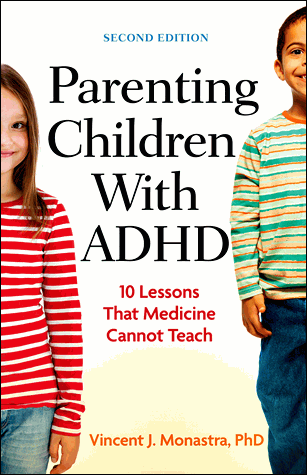 Written by a psychologist who has lots of experience working with kids with ADHD, this is an easy-to-read book that is broken down into short chapters giving a nice overview of ADHD and explaining things that are important for kids with these issues that doesn’t involve medication. Also, it’s not that Dr. Monastra is anti-medication, it’s just that his experience (and scientific research) has shown that there are additional/other interventions that can be helpful for kids (and adults!) with ADHD. Basically, medication alone is not enough. He talks about things like diagnosis, the role of medication and what it can and can’t do, how to work with the school to support your child’s success, developing emotional control, and giving yourself a break as a parent.
Written by a psychologist who has lots of experience working with kids with ADHD, this is an easy-to-read book that is broken down into short chapters giving a nice overview of ADHD and explaining things that are important for kids with these issues that doesn’t involve medication. Also, it’s not that Dr. Monastra is anti-medication, it’s just that his experience (and scientific research) has shown that there are additional/other interventions that can be helpful for kids (and adults!) with ADHD. Basically, medication alone is not enough. He talks about things like diagnosis, the role of medication and what it can and can’t do, how to work with the school to support your child’s success, developing emotional control, and giving yourself a break as a parent.
Excerpt from the publisher’s summary: “Kids with ADHD need to be loved and shown how to become successful adults. Unfortunately, their lack of attention and restlessness often get in the way. Parents of these kids try so hard to stay connected and remain patient in the face of daily frustration. However, it is an incredible challenge to remain positive and involved when your child does not respond to the kinds of strategies that work for other children. Without guidance and systematic treatment, these bright, inquisitive children are unlikely to graduate from high school, are more prone to use illegal drugs, and struggle to maintain employment as adults.”
Note: I have the 2005 version. In writing this post I see that there is a 2014 version. So I don’t know what has changed between the two.
* I don’t make any money from the books that I recommend. My reviews are solely based on wanting to let people know what’s out there and could be helpful to them.
What to Do When Your TEMPER FLARES by Dawn Huebner, PhD share
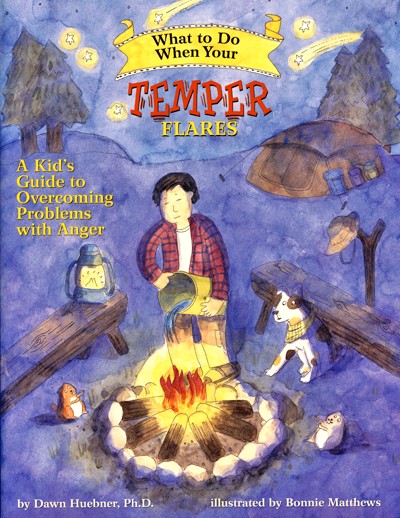 This is a fabulous workbook for kids. The book suggests using it from ages 6-12 but I think that is a loose guide and depends on the mindset of the child as well as their ability to understand that other people’s thoughts can be different than their own. Using fire as a metaphor for anger, the words and pictures then walk the reader through several different skills and approaches that can help a person develop a “longer fuse.” Explanations are concrete, using visual metaphors and practice to help increase skills that are very effective in managing anger. The author teaches, among other things, how our inner thoughts can affect our feelings and that if we work to adjust our thinking and give situations more of the benefit of the doubt,
This is a fabulous workbook for kids. The book suggests using it from ages 6-12 but I think that is a loose guide and depends on the mindset of the child as well as their ability to understand that other people’s thoughts can be different than their own. Using fire as a metaphor for anger, the words and pictures then walk the reader through several different skills and approaches that can help a person develop a “longer fuse.” Explanations are concrete, using visual metaphors and practice to help increase skills that are very effective in managing anger. The author teaches, among other things, how our inner thoughts can affect our feelings and that if we work to adjust our thinking and give situations more of the benefit of the doubt,
I use this book in session with some of my clients. Parents can also use this on their own with their kids and there is an introduction in the beginning of the book to help guide parents through how to approach it. With a positive, supportive approach you can really deepen your relationship with your child by being a resource that can help him or her to work through these challenges.
* I don’t make any money from the books that I recommend. My reviews are solely based on wanting to let people know what’s out there and could be helpful to them.

